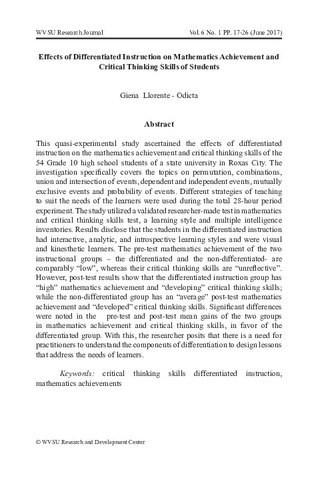Effects of differentiated instruction on Mathematics achievement and critical thinking skills of students
| dc.contributor.author | Odicta, Giena L. | |
| dc.coverage.spatial | Capiz | en |
| dc.date.accessioned | 2024-03-20T02:18:01Z | |
| dc.date.available | 2024-03-20T02:18:01Z | |
| dc.date.issued | 2017-06 | |
| dc.identifier.citation | Odicta, G. L. (2017, June). Effects of differentiated instruction on Mathematics achievement and critical thinking skills of students. WVSU Research and Development Center, 6(1), 17-26. | en |
| dc.identifier.issn | 22444335 | |
| dc.identifier.uri | https://repository.capsu.edu.ph/handle/123456789/200 | |
| dc.description.abstract | This quasi-experimental study ascertained the effects of differentiated instruction on the mathematics achievement and critical thinking skills of the 54 Grade 10 high school students of a state university in Roxas City. The investigation specifically covers the topics on permutation, combinations, union and intersection of events, dependent and independent events, mutually exclusive events and probability of events. Different strategies of teaching to suit the needs of the learners were used during the total 28-hour period experiment. The study utilized a validated researcher-made test in mathematics and critical thinking skills test, a learning style and multiple intelligence inventories. Results disclose that the students in the differentiated instruction had interactive, analytic, and introspective learning styles and were visual and kinesthetic learners. The pre-test mathematics achievement of the two instructional groups – the differentiated and the non-differentiated- are comparably “low”, whereas their critical thinking skills are “unreflective”. However, post-test results show that the differentiated instruction group has “high” mathematics achievement and “developing” critical thinking skills; while the non-differentiated group has an “average” post-test mathematics achievement and “developed” critical thinking skills. Significant differences were noted in the pre-test and post-test mean gains of the two groups in mathematics achievement and critical thinking skills, in favor of the differentiated group. With this, the researcher posits that there is a need for practitioners to understand the components of differentiation to design lessons that address the needs of learners. | en |
| dc.language.iso | en | en |
| dc.publisher | WVSU Research and Development Center | en |
| dc.relation.uri | http://wvsu.edu.ph/files/pdf/urdc%20research%20journals/June%202017%20issues/2DIFFERENTIATED%20INSTRUCTION.pdf | en |
| dc.rights | Attribution-NonCommercial-NoDerivatives 4.0 International | * |
| dc.rights.uri | http://creativecommons.org/licenses/by-nc-nd/4.0/ | * |
| dc.subject | Critical thinking skills differentiated instruction | en |
| dc.subject | Mathematics achievements | en |
| dc.subject.lcsh | Critical thinking | en |
| dc.subject.lcsh | Mathematics | en |
| dc.subject.lcsh | Teaching | en |
| dc.title | Effects of differentiated instruction on Mathematics achievement and critical thinking skills of students | en |
| dc.type | Article | en |
| dc.citation.journaltitle | WVSU Research Journal | en |
| dc.citation.volume | 6 | en |
| dc.citation.issue | 1 | en |
| dc.citation.firstpage | 17 | en |
| dc.citation.lastpage | 26 | en |
Files in this item
This item appears in the following Collection(s)
-
Journal articles published externally [23]
These are journal articles by CAPSU authors published externally.


